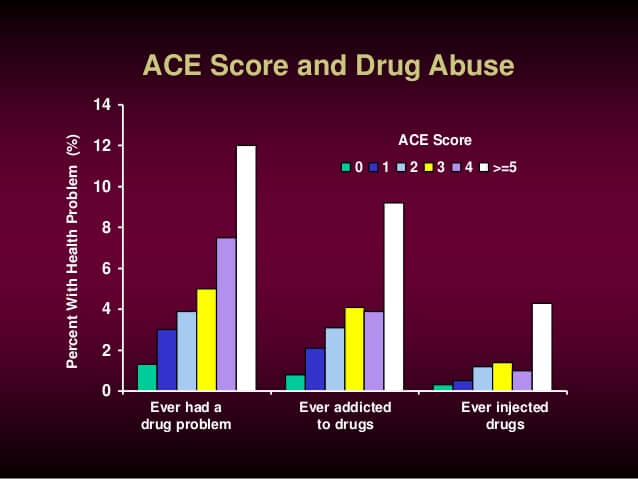Few people recognize that childhood trauma is a component that is strongly linked with rates of substance abuse addiction, health problems, suicidal ideation, and even early death. Many people attribute these struggles to a lack of willpower, a lack of motivation, unluckiness, or even worse, a defect in one’s character. However, we can link many of these struggles to a common factor – childhood trauma.
How ACE Scores Measure Childhood Trauma
Childhood trauma is a traumatic experience that occurs from ages 0-18. It has an enormous impact on one’s development, perception of the world, and even one’s psychology. In 1995, researchers performed a study exploring the relationship between childhood trauma and health issues experienced later in life. They used a tool called the ACE (Adverse Childhood Experiences) Assessment, a 10-question survey, to measure the abuse, neglect, and overall adverse childhood experiences that participants had lived through. After completing this quick assessment, researchers assessed participants’ broad adult health history.
With this information, scientists measured the significance between participants’ ACE score and their health history. The findings were incredible. For participants who had scored 4/10 or greater, meaning they had experienced 4 or more listed traumas during their childhood, their risk of health issues increased exponentially. Some of these problems include:
- Substance abuse
- COPD
- Depression
- Liver disease
- Intimate partner violence
- STIs
- Smoking
- Suicide attempts
- Unintended pregnancy
- Teen pregnancy
- Early initiation of smoking and sexual activity.
This study proved and measured the scientific link between childhood trauma and health-related issues through adulthood.
How Does Childhood Trauma Relate to Substance Abuse in Adulthood?
Researchers have performed extensive research on the long-term effects of childhood trauma. One important factor to consider is that childhood, especially early childhood, is the most crucial time in a human’s brain development. Children are the most vulnerable to outside influences which will contribute to permanently shaping their brain.
Studies show that exposure to traumatic stress in childhood negatively affects neurodevelopment in children. This causes changes to the structure and function of many crucial areas in the brain. This, in turn, reduces the functionality of these regions and leads individuals to experience issues such as:
- Emotional regulation
- Memory
- Aggression
- Stress responses
- Sexuality
- Substance abuse
Children with higher ACE scores experience more traumatic stress, which indicates a higher risk of problems with brain development. Researchers link higher ACE scores to early alcohol abuse, which decreases functionality while the brain is still developing and vulnerable. Decreased functionality of some areas of the brain can make coping with stressors, regulating one’s emotions, and controlling impulses even more difficult. Sometimes, this leads to substance abuse as a coping mechanism.
The Cycle of Abuse Within Families
Researchers found that the relationship between ACE scores and alcohol abuse is strong. Many children who grew up with an alcoholic have also experienced adversity such as violence, neglect, sexual and emotional abuse. Witnessing all of this violence leads to higher ACE scores for these individuals.
Individuals with high ACE scores are also more likely to suffer from intimate partner violence in adulthood, marrying an alcoholic, and alcohol addiction. This risk, along with the risk of coping mechanisms that they observed during childhood, shows how the cycle of abuse and substance abuse can repeat within families.
Of course, substance abuse in adulthood is often a result of a lack of effective coping skills for one’s trauma. Many survivors of childhood abuse were not given tools as children to effectively cope with their trauma. Often, the people who normally supply those skills are the ones causing their abuse. If and when these children make it to adulthood, their trauma is often brushed off or ignored, and they are often faced with the pressure of surviving in adulthood with the abilities and resources available to them. They are then pushed into coping with their issues on a daily basis to survive instead of resolving their trauma in a healthy way. Many times, a lack of resources and coping skills leads survivors to believe that facing and resolving their childhood trauma is too difficult or even impossible. This leads them to “escape” through substance abuse instead.

What Should I Do if I Have a High ACE Score?
If you have experienced a great deal of childhood trauma, that does not mean you will inevitably suffer from addiction. Everyone is different. This study only revealed that addiction and adverse childhood experiences are correlated, not that they are intrinsically linked.
Seek Therapy
A great first step to take in recovering from childhood trauma is to seek help from a trained professional. Some therapists specialize in trauma. These individuals are experienced and knowledgeable about trauma recovery and can help guide you through that process. They can also teach you valuable coping skills. These skills will be helpful to combat stress and conflict in a healthy way. Therefore, you can feel confident in your ability to handle stressful life situations without turning to self-destructive means.
Have A Support System
Additionally, having a support system such as friends, family, case-workers, or other trusted professionals is an important aspect of recovering from trauma. If you feel like you are in over your head, you can fall on your support system to help meet your needs.
How Liberty Bay Recovery Center Can Help
If you grew up in a family with a history of substance abuse and addiction, you can break the cycle. Recognizing the problem is the first step in creating change. If you are here, you have probably already started the work to do so. The next most important step is to see a professional to work through your trauma. This will help you become more aware of the ways you may perpetuate unhealthy learned behaviors. Therapists who do cognitive-behavioral therapy (CBT) with clients can help them to work through these ideas and essentially “re-wire” the brain to create alternative pathways to those created by trauma. If you truly want to break the cycle, and you are willing to invest the work necessary, then you can overcome the cycle of addiction within your family.
If you are currently suffering from addiction, help is out there. There are treatment facilities, such as Liberty Bay, that exist to help you recover and reach your full potential. In a treatment facility, one component of your care should include meeting with a therapist one-on-one for regular sessions. They can help you work through underlying causes for your addiction, such as childhood trauma. A trained professional will guide you through the healing process and help you to patch up the untreated wounds that may feed your addiction. At the same time, you should receive treatment in a group setting as well.
You Can Recover From Childhood Trauma and Addiction. Happy Recovery.
At Liberty Bay Recovery Center, our therapists do great work uncovering and helping to heal wounds that contribute to our residents’ substance abuse issues. By treating underlying causes as well as the addiction, our multi-faceted approach helps people reach long-term recovery.



